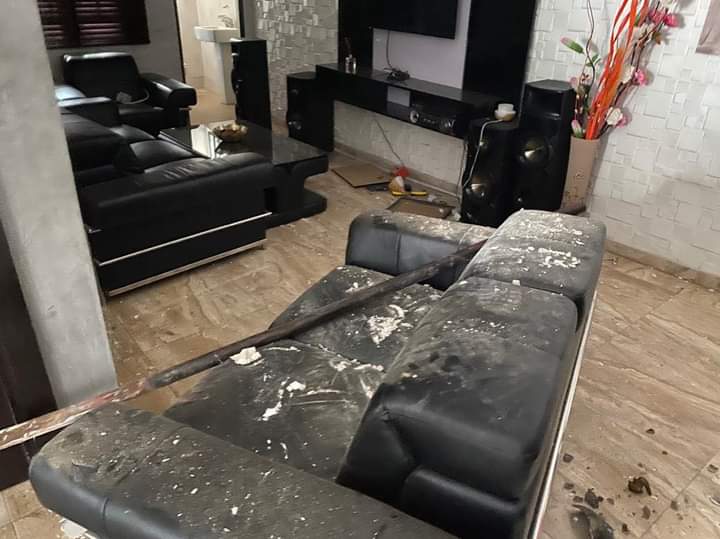On July 5, Femi Falana, human rights lawyer, said there is no law that supports night raids on residences of citizens.
Speaking during a programme on Channels Television, the senior advocate of Nigeria (SAN), described the raids on residences of citizens by security operatives as “dangerous legacy” of the military era.
Falana was reacting to the raid by operatives of the Department of State Services (DSS) in the Ibadan home (pictured) of Sunday Adeyemo, a Yoruba youth leader better known as Sunday Igboho, on the night of July 1.
“There is no law in Nigeria that allows you to arrest anybody in the dead of the night. I mean, you are not planning a coup. We aren’t armed robbers,” Falana said.
Advertisement
He said there is no provision under the law that a citizen can be arrested at night — unless the crime is committed in the night.
WHAT DOES THE LAW SAY?
Speaking on the raid, Peter Afunanya, DSS spokesperson, did not state whether the secret service got a search warrant from the court to carry out the operation but he said the DSS “procedurally searched the house”.
Advertisement
The raid on Igboho’s residence by the DSS has been a matter of legal debate as many legal experts have weighed in on the legality of the DSS’ method of arrests.
TheCable searched through legal provisions that serve as a framework for the operations of law enforcement agencies in the country, including the DSS.
Section 148 of the Administration of Criminal Justice Act (ACJA) 2015 indicates that the arrest of suspects can be carried out “any time” by law enforcement agencies with a search warrant.
Section 148 of the ACJA 2015 states: “A search warrant may be issued and executed at any time on any day including a Sunday or public holiday.”
Advertisement
The use of “any time” in section 148 of the ACJA 2015 implies that a person’s residence can be searched or the individual arrested any time of the day, including at night if a warrant is issued by the court to that effect.
This means that the DSS can effect an arrest, if a warrant is issued by the court to that effect at any time of the day, including at night or on Sunday and public holidays.
Section 149 (2) of the ACJA 2015 also provides that the law enforcement officer (s) enforcing the warrant can resort to “force reasonably necessary for the purpose” when access is being denied.
The section states: “Where access into the building, thing or place cannot be obtained, the police officer or other person executing the search warrant may proceed in the manner prescribed by section 9, 10, 12 and 13 of this Act.”
Advertisement
A glance at sections 9(1) and 12(2) of the ACJA 2015 shows that the officer(s) enforcing the warrant can resort to force when access is denied.
Section 9(1) of the ACJA 2015 states: “Where a suspect is arrested by a police officer or a private person, the officer making the arrest or to whom the private person hands over the suspect:
Advertisement
“(a) May search the suspect, using such force as may be reasonably necessary for the purpose.”
Section 12(2) of the ACJA 2015 states: “Where access to a house or place cannot be obtained under subsection (1) of this
section, the person or police officer may enter the house or place and search it for the suspect to be arrested, and in order to effect an entrance into the house or place, may break open any outer or inner door or window of any house or place, whether that of the suspect to be arrested or of any other person or otherwise effect entry into such house or place, if after notification of his authority and purpose, and demand of admittance duly made, he cannot obtain admittance.”
Advertisement
VERDICT
The claim made by Falana that no Nigerian law allows the arrest of citizens at night is inconsistent with section 148 of the ACJA 2015. The use of “any time” for the enforcement of a warrant implies that arrest can be executed any time of the day, including at night.
Advertisement
4 comments






In other words, Falana lied.
By way of semantics Femi Falana meant that you can not arrest anybody in the dead of the night without a court warrant. Also minimum force does not include killings of occupants of the premises
What is the difference between a search warrant and an arrest warrant?
It says such a one can be arrested any time of any day ( not any time of any night).
Day is quite different from the Night. Every knowledge knows that we have a day and a night. And, security forces know this in the course of the rules well.